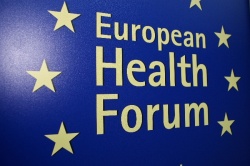The European Health Forum Gastein
Hans Christian Pruszinsky reports
More than 600 distinguished guests from 40 countries are expected at this year’s European Health Forum Gastein (EHFG). ‘Since its foundation in 1998, the EHFG has developed into an international meeting point for the highest-ranking healthcare politicians, managers and scientists from all over the world,’ said EHFG President Professor Günther Leiner.


‘When the issue is health-political discussion and exchange of experiences on the highest level, then the EHFG is probably unique in Europe today.’
Guests include around 20 ministers and secretaries of state for healthcare, high-ranking representatives of the EC, World Bank, WHO and others from healthcare and services industries.
Key speakers at the Plenary Sessions include Minister of Health Alois Stöger diplomat, EU Commissioner John Dalli and WHO Director Zsuszana Jakab.
Financial crisis endangers aging with dignity
One of the key themes, Demographic change and the future of health, poses the question how regions worldwide can learn from one another. Prof. Leiner stressed that European healthcare systems must prepare for future demographic challenges because the proportion of those aged over 60 years will increase from the current 20% to 35-38% in 2035. For Austria this means that the 75-85-years group, currently around 465,000, will increase to over 700,000 and the 85-years group will increase from currently 104,000 to 280,000. In 2035, between 2.7 million and three million people in Austria will be over 60 (Source: Statistik Austria). ‘The world will look very different in the future and policies must be prepared,’ Prof. Leiner reflected.
Forum EU action and local partnerships for health
For the first time, in 2008 the majority of the world’s populations lived in cities; the highest European urbanisation growth was seen in the new accession countries. In many West European countries 80% of the population live in cities. Inequalities in health outcomes within a city, and between cities, can be compared to the differences between the developed and developing world. Therefore, for Europe to be ready for the future it is vital to focus on health and social environment in cities, i.e. urban health and well-being, which relies on multi-disciplinary, multi-agency, vertical and horizontal policy-making approaches, building on partnerships involving civil society, industry, health/social care professionals, governments (local, regional and national) and non-governmental organisation, including the voluntary sector. The EU has many actions for partnerships/stakeholders in the field of improving health for city populations, from empowering citizens, to research projects and programmes. The parallel forum will aim to demonstrate how local and regional partnerships integrate to achieve a healthy environment within the context of both EU policy and research mechanisms.
European Health Award 2010
The 13th EHFG has announced the €10,000 European Health Award for cross-border healthcare initiatives in Europe that have significant potential for quality improvements and increases in efficiency. The shortlist includes, amongst others:
Chronic Diseases Alliance: a united prevention approach
Chronic, non-contagious diseases are responsible for 80% of all deaths within the WHO Europe region. They are linked to four major problems: tobacco, bad diet, alcohol and lack of exercise. Although not always curable they are largely treatable. The project European Heart Network unites ten non-profit European healthcare organisations, representing over 100,000 healthcare workers. The objective is to develop evidence-based recommendations for interventions on a broad scale and facilitate united political initiatives for the effective prevention of these diseases across Europe.
Life with Parkinson’s Awareness Campaign
The campaign to create greater awareness of life with Parkinson’s disease, initiated by the European Parkinson’s Disease Association (EPDA), unites France, Germany, Greece, Hungary, Ireland, Italy Norway, Romania, Spain, Slovenia, Slovakia, Turkey and the UK. The objective is to ensure that all Parkinson’s sufferers and their families can access the correct disease management and treatment. This is to be achieved through the development, distribution and translation of printed and digital information for further use by member organisations and in national campaigns. Consistent media work on all levels also aims to inform these patients in the best possible way, to improve disease management and manage the high social and economic burden efficiently.
EUnetHTA Joint Action – European Network for Health Technology Assessment
Health Technology Assessment, the assessment of the effects of medical-technological and pharmaceutical innovations and the control of efficiency and cost effectiveness, is a central task required to optimise the use of limited resources in healthcare systems and make the distribution of resources transparent. EUnetHTA is a project started by the National Board of Health Copenhagen financed by the EU, to run for several years. Participants: 23 member states, as well as Norway, Switzerland and Croatia. The objective is to achieve sustained, permanent cooperation in Health Technology Assessment in Europe; streamlining individual activities to reduce redundancies; development and application of processes for the efficient exchange of information about new technologies, and coordination between all decision makers with regards to efficiency and follow-on costs of medical-technological innovations.
07.09.2010





